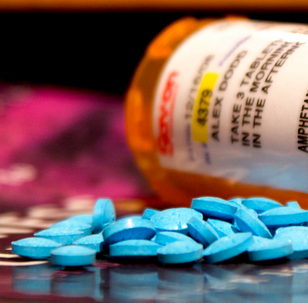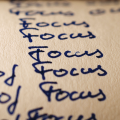A Reader’s Experience of Taking Adderall To Help With Focus

When I decided to undertake a trial run of Adderall, a prescription drug that has both helpful and harmful uses, I also decided to share the story with our community. I figured if I’m struggling with something, I’m probably not the only one, so I thought it would be best to publish the whole experience, including both the benefits I’m seeing as well as the concerns I have.
We don’t have comments on every AONC post, but I left them on for that post so that people could chime in with their contribution. As you can see, some people think it’s a terrible idea, others think it’s entirely reasonable, and others wrote about their own experience with prescription medication.
Just as interesting was all the feedback I received by email. I heard from a lot of people who write in privately to say that they’ve been struggling with focus. Some of them have also experimented with solutions of their own, including Adderall prescriptions, other prescription drugs, organic or natural medications, and other, non-medical solutions such as meditation.
One of the emails I received caught my attention because it was so detailed and specific. I thought it could be helpful to others who struggle with the same issues—and I asked permission to share some of the details without any identifying information.
The comments from this reader are included below, with only a few edits to protect their privacy.
A Reader’s Experience
Hey Chris! We haven’t talked in a while, but I read this post and wanted to provide an experience from someone who’s been doing this for a while. Here’s the short version:
- I’ve been prescribed Adderall for the past 3 years or so. I started taking it around age 27
- I’d experimented with it (as well as Concerta & Vyvanse) before during college, getting some from friends
- Looking back at my formal schooling years I could see it might have been very helpful then, I was a very good student, but I hated learning via lectures—I just couldn’t focus during them. Instead, I would draw during class or I would work on studying for one class while I was in another class, learning independently
- 3+ years In, I’ve gone from taking ~10mg/workday to ~15-30mg/workday depending on the day and the project
From my experience, there are definitely upsides and downsides.
Upsides
- Definite focus and energy boost. Your Limitless reference is right on the mark
- It’s fantastic for learning new things. You can dive in and go deep on subjects rapidly (though I suggest using some of that time to build documents that can provide reference points to look at later, since your brain is processing so much it’s hard to remember it all in the future)
- It’s fantastic for rapid batch processing of to-do lists of short tasks: email, quick processes, etc.
- It’s awesome for creative projects — writing, deck building, website making, design, etc — but only when you already have an idea what you want to make (more on that later)
Downsides
Improved efficiency can be detrimental in a couple of ways if you don’t manage it well.
- Task-switching can be very difficult: You want so badly to go deeper on what you’re working on, or something new that sparks your interest that you go deeper down a rabbit hole than you should, neglecting other not as interesting things that you really should have done.
My solution: Have a clear path of priorities with start and stop times. Start with what you need to get done or you might not get to it.
- You see way more opportunities of things that can be done, and how to do them: But you can’t go down all those paths simultaneously. So there ends up being some dissonance pulling you in multiple paths at once.
My solution: The “someday/maybe list” concept snagged from the GTD method. Capture the idea somewhere so you’re not holding on to it, and then add subsequent builds on the idea to the same doc for future reference. I manage it in Trello.
- Personal Interaction + Active Listening: For both of the reasons above, it’s easy to be shorter and more blunt in personal interactions and/or not listen fully in long conversations (because your mind follows an interesting thread elsewhere). Or just not going out and talking to people at all, getting lost in a learning rabbit hole.
My solution: This is the toughest for me personally, but I try to actively manage more since I know it’s an issue. I’ve found exercise, yoga, and quick meditation (Calm app) work really well to slow distractions down a bit.
- Creativity: Referencing the point above on creativity. Adderall is great when you know what you want to create. But if you don’t know yet what you want to create, it can lead to really rapid “concept-killing.” You can be very quick to conclude that an idea won’t work and it really tough to keep “all ideas are good” brainstorming going when you’re more in “i can totally see how and why that won’t work” mode.
- Health + Dependency: I’ve incrementally increased my dosage over the past few years. Not a ton, but some. I prefer only taking 15mg/workday at this point, only upping on days I need to go really deep into a project. I rarely take it on the weekends. My biggest question to myself is, “Do I want to take this forever? And if not, how do I stop that from being inevitable?”
As you may have suspected, this email was written on A… 😉
***
I really appreciated hearing all of these details from someone who’s been doing it for a while. As discussed, if you’re struggling, be sure to talk to a professional—but also be sure that you remain ultimately responsible for your own health and well-being. That’s my perspective, anyway, even if some people disagree.
Note: there aren’t any comments on this post, but if you have something to contribute you can still chime in on the original thread. We’ve posted all submitted comments on this topic, both positive and negative.
Remember, stay focused. 🙂
###
Image: Alex







